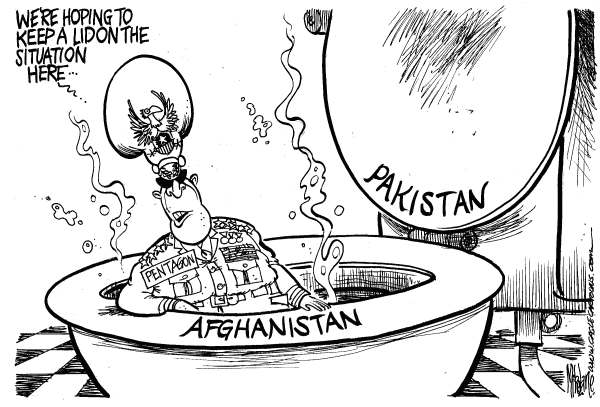Search
Democracy Links
Member's Off-site Blogs
follywood .....

from Crikey …..
Why are we fighting in Afghanistan?
Melbourne barrister and human rights advocate Brian Walters SC writes:
So we are going to send another 450 young Australians to fight in Afghanistan. Some of these young men will die. Others will be fearfully injured. We’d better be very sure it is worth putting our people in harm’s way.
Kevin Rudd gave only two reasons: to prevent Australians dying from terrorism and to comply with our ANZUS treaty obligations.
Sending soldiers to occupy a foreign country far from our shores is no way to repress terrorism. If anything, the resentments created are apt to nourish terrorism and make us more of a target. The Taliban gain their traction from fighting foreign invaders and the al-Qaeda training camps are long gone anyway. The PM’s first reason makes no sense: getting Australians killed is no way to protect Australians.
As for his second reason, the ANZUS treaty imposes no obligation on Australia relevant to the Afghan conflict. The operative article provides:
The Parties will consult together whenever in the opinion of any of them the territorial integrity, political independence or security of any of the Parties is threatened in the Pacific.
The requirement is for consultation, not the sending of troops, and relates to threats in the Pacific - a theatre which on no view includes Afghanistan. Of course, the US no longer respects any obligation to our neighbour New Zealand under this treaty anyway.
Why are we in Afghanistan at all? What really are the aims of this war? How will we even know when we’ve won it? Unless there are clear answers to these questions, our involvement is immoral.
Nine days after the 9/11 attack, President George W Bush demanded that Afghanistan “deliver to United States authorities all of the leaders of Al-Qaeda who hide in your land.” The demand was an ultimatum. President Bush said in his address to Congress “They will hand over the terrorists or they will share in their fate.”
The Taliban rulers of Afghanistan asked for evidence to demonstrate Osama bin Laden’s involvement in the September 11 attacks. If such evidence warranted a trial, they offered to handle the trial in Afghanistan.
The US refused to offer any evidence. They made no request for extradition. There was no pretence of legal process. Like the leader of a Southern lynch mob, Dubya was sending in his boys to do rough justice on Osama bin Laden and wasn’t going to let legalities get in the way.
On 7 October 2001 the invasion began with a large-scale bombardment. The stated purpose was to capture Bin Laden, destroy al-Qaeda, and remove the Taliban regime for harbouring them. For thousands of years, conquering armies had come to Afghanistan because of its strategic position at the crossroads of empires. Now it was invaded because it was a dead end backwater where a fugitive was hiding.
The US and its allies missed Osama bin Laden, so the rhetoric for the war changed. It was really, we were told, all about restoring democracy (often coupled with restoring the rights of women).
If this is the reason Australia sent troops to Afghanistan, it hasn’t worked. Sure, there now is a vote in Afghanistan for those where Kabul’s writ runs and that is something. But without more it does not amount to democracy. It is the essence of democracy to respect the rule of law and to listen to different voices. To go to war rather than go to law, to use force rather than negotiation, is the antithesis of the democratic ideal. Far from spreading democracy, the invasion has undermined it. At the same time, the new regime in Afghanistan has proved almost as oppressive to women as the Taliban.
More than seven years after the invasion, the Taliban remains a growing force precisely because of the western military presence. Tension with Pakistan and throughout the region has spread. There is no official record of civilian casualties, but the UN Assistance Mission in Afghanistan lists 2,118 Afghan civilians killed by armed conflict in 2008 alone. The civilians killed in Afghanistan now far outnumber those killed in the US on 9/11.
Afghanistan has been a sorry place for invaders. In 1839 the British amassed their huge Army of the Indus, which stretched for 30 miles when it marched. They invaded Afghanistan, engaged in regime change, but an insurgency slowly built up around them. When they finally retreated in 1842, only one man made it out to the British garrison at Jallalabad. More recently the Soviets, with far larger forces than those currently occupying the country, were eventually driven out.
Sending more troops to Afghanistan only exacerbates the folly of our involvement in the first place. Far from sending more troops, it’s time to bring our young men and women home.
- By John Richardson at 4 May 2009 - 8:43pm
- John Richardson's blog
- Login or register to post comments
Recent comments
1 hour 9 min ago
1 hour 19 min ago
1 hour 27 min ago
1 hour 53 min ago
2 hours 5 min ago
2 hours 10 min ago
5 hours 40 min ago
6 hours 51 min ago
6 hours 56 min ago
7 hours 55 min ago